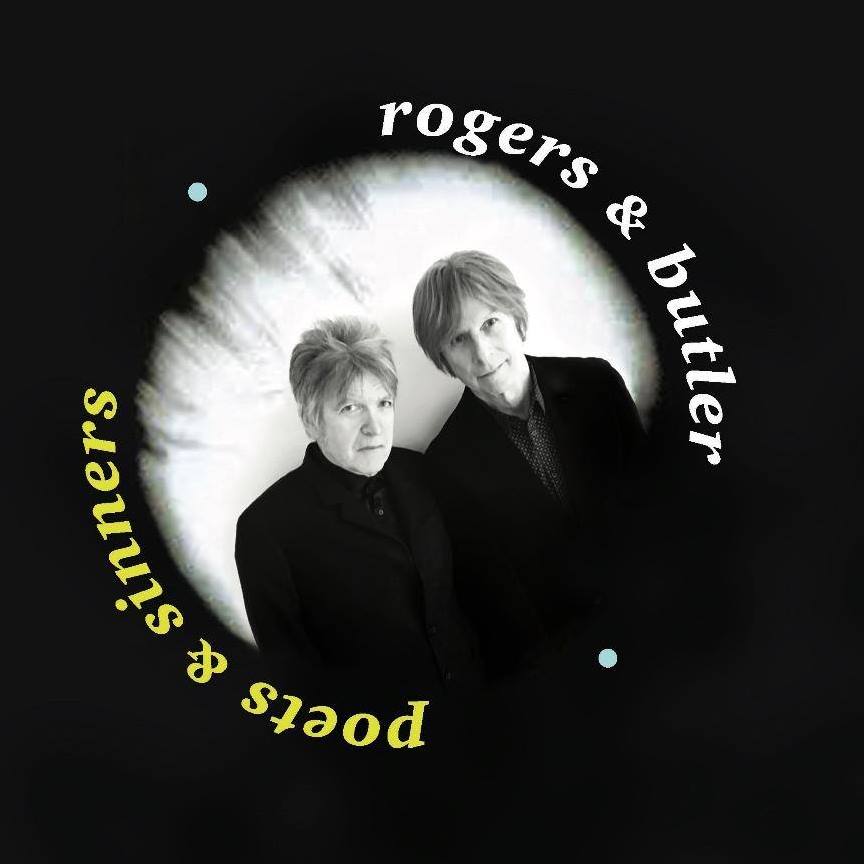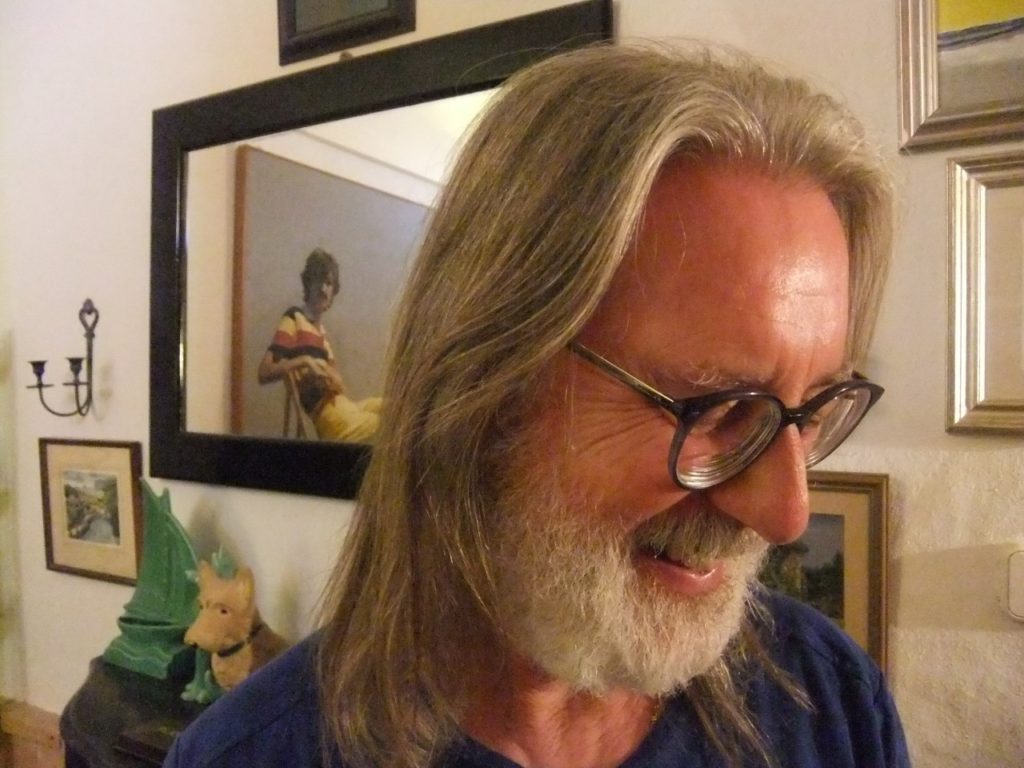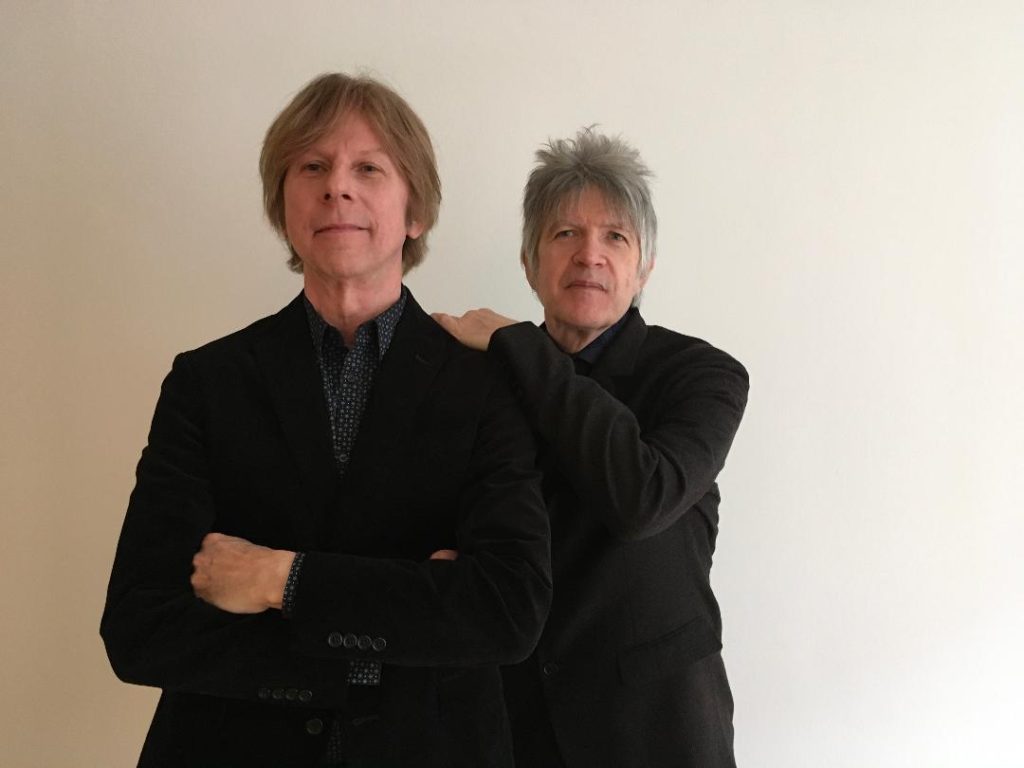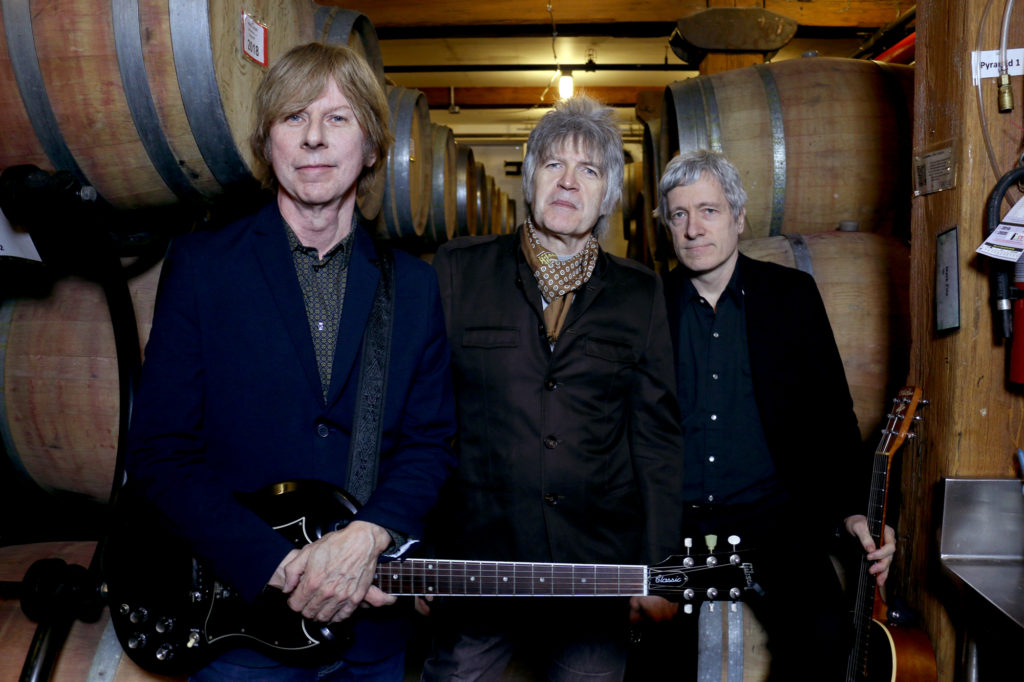Songwriter John Howard interviews Edward Rogers & Steve Butler about their new album Poets & Sinners.
John Howard: I love your Rogers & Butler’s album, Poets & Sinners, for many reasons, full of great songs, fantastic musicianship, lovely production and arrangements – but I also love it because it takes me back to when songwriters wrote good solid songs with great tunes and hooks.
I don’t really like making comparisons (“comparisons are odorous” as Shakespeare’s Malaproppish Dogberry said in ‘Much Ado About Nothing’). For example, I’ve been compared many times to Elton John, which, apart from the fact we both play the piano and sing I cannot hear at all.
But throughout your album I can hear touches of The Kinks, The Zombies, ‘60s Mike D’Abo period Manfred Mann, occasional Ziggy/Bowie, Mott The Hoople, The White Album Beatles, even Boomtown Rats on one track and, gulp! just here and there The Eagles! Would you say that was a fair observation? Or do comparisons annoy you as they often do songwriters and artists who have created something new and entirely their own?
Edward Rogers: I must admit, I’m foremost a fan of almost all the artists you list, especially your reference to the Mike D’Abo Manfred Mann period; very cool. And, whether it’s conscious or subconscious, my influences of course affect the way I write. It’s also the way I express to musicians how I want a song to feel and sound. Love your reference to The Boomtown Rats; I think “I Don’t Like Mondays” is a classic song. Hey, maybe you should cover it! The one reference you make that may be in Steve’s background more than mine, is The Eagles. One of our songs is called “Jump Like Alice,” which may be the song you’re referring to. I personally think it has a very Tom Petty/Roger McGuinn feel to it. But, the lyrics were actually written about a woman I knew who used to work at Max’s Kansas City here in New York. I was feeling the Velvet Underground vibe, but Steve put his ‘shine’ on it and gave it a more traditional American rock n roll feel.
JH: Was the late ‘60s/early-to-late ‘70s vibe on the album intentional or is it in your and musical DNA so much it’s unavoidable?
Steve Butler: The 1960’s through 1970’s vibe of the record is where Edward and I come from as young aspiring musicians and writers. You grow up with that music and it sticks with you throughout your life. We both listen to new music too. We’re not hermetically sealed in the past! We did have one record in particular that we both loved, and thought it might be a guide for the album and the record is ‘Face to Face’ by The Kinks. It’s one of my all-time favorite records. I remember buying it with Green Stamps at the grocery store. It was one of my first records to own exclusively. I have two older brothers and they were the ones who owned the LPs, not me. I don’t know if the record sounds anything like ‘Face to Face’ but it helped us move towards the goal of making a record that was varied in style with a mix of the old and the new. One song, “Noel Coward,” is an example. Very 1920s/30’s style of song that The Kinks could pull off so well. We had great fun recording that song. I played my mom’s Uke on that one! And yes, to the question, it is in our DNA.
John Howard
JH: Was the album produced by Don Piper, or is it a joint production by Ed, Steve and Don?
SB: Don is the producer and engineer too. He captures the sounds and helps with the arrangement and plays on the record as well. He’s our third eye. We all participate in arranging and offering suggestions as to what the finished record will sound like. I usually produce myself and I also produce other artists. I’ve had a few not so positive experiences with outside producers but with Don, it was what I always thought having a good producer was all about. He creates an environment that’s conducive to creativity. He listens and in the end, can be the one who makes the call, especially if Edward and I need that decisive opinion.
JH: How did you first get together? Where did you meet and through whom? How long has there been a Rogers & Butler?
SB: Edward and I met about 8 years ago at the Cutting Room in NYC. We are both recording artists for Zip Records. Smash Palace (my other band) and Edward Rogers were on the same bill. I was familiar with Edward’s music so I went over to his table and introduced myself. I mentioned to Edward that he reminded me of an obscure recording artist (no one I knew was familiar with this gentlemen) and said “you sound a bit like Duncan Browne” to which Edward replied “I know of his music very well” .. so, with that comment, our friendship was sealed. Funny how when you share a love of a certain style of music with someone, it can immediately endear that person to you. We spoke of doing some writing together for a while and then Edward sent me some lyrics he was working on and I set them to music. We both liked the song a lot and continued writing more songs. A few of them ended up on Edward’s next solo record. The writing was so easy and fast. I have a so many tunes in my head. I play guitar incessantly, much to the annoyance of those around me sometimes, so there’s always a melody in my brain. Edward is a prolific lyricist so between the two of us, the songs came quickly. We had other songs we had written and decided that it would be interesting to release an EP (Diana Dors) on Zip Records. That recording was released last year. It received a positive reception, and before we knew it, we had written another dozen or so songs and decided to make a full-length record, which became ‘Poet’s & Sinners’.
JH: Tell me a little of both of your musical history? What bands were you both involved with along the road towards Rogers & Butler, and when did you start writing, performing and recording, separately and together?
ER: Good one, John. Plain and simple, I was asked to be a drummer in a band that was being formed. They said I had the look of a drummer, claiming ‘you’re the next Clem Burke’. Fat chance! But, while in the band, I started writing songs which were slowly brought into the project. You know what they say about drummers who write songs? NEXT! When I had my accident (in 1985), believe it or not, I still drummed; my timing got better, but my playing had to be simplified. What really got me into songwriting was meeting singer-songwriter George Usher and then soon after, Amanda Thorpe, who formed Bedsit Poets with me. George was instrumental in my first two solo albums. The invention of Garage Band and then Logic enabled me to record the music that was in my head. I still use Logic to formulate songs to this day.
SB: I was brought up in a musical family. My mom was a pianist, songwriter, poet, writer, artist and did all of these things to make a living. My older brother joined a band as soon as The Beatles came out. Watching all of this growing up led me to believe that you could do this for a living too. I had so much support. My mom taught me to play the Ukulele and then I moved on to guitar. I started writing songs with my older brother when I was 12. His band was successful, and they needed original material. I was in the right place at the right time. My brother and I played in bands through our teenage years. I grew up in New Jersey near Philadelphia Pa. When the punk scene exploded in NYC, we went there and auditioned at CBGB’s. The band at the time was named Quincy. Hilly Kristal got us a record deal with Columbia Records. The band was doing a gig in LA at the Whiskey when Quincy Jones saw our name on the marquee and sued us for stealing his name. I kid you not! Columbia caved and we had to change our name. My brother and I quit the band during the making of the next record and formed the band Smash Palace and signed with Epic Records. I still play in that band. Edward still does his solo works so we kind of switch back and forth between our respective projects. I’ve learned a lot by working with Edward. His lyric style is different than mine so I’ve picked up some techniques he uses. We work off of each other’s strengths. It’s a labor of love making these recordings with Edward, as well as Don Piper, Sal Maida and Dennis Diken, the core members.
JH: What’s the full line-up on the album? It’s a great band backing you for sure. Is it your touring line-up or was it put together just for the album sessions?
ER: This is my dream band. Steve, Don and I are obviously the core, but having Sal Maida (bass), Dennis Diken (drums) and Joe McGinty (keyboards) completes the ideal recording – and if we had the budget – touring band. We all speak the same language, have the same references, are great mates and are all committed to making the best music we can. We hope to play a couple of full-band live shows in the future to showcase the dynamics of how great this band is.
JH: Where was the album recorded and when?
SB: The record was made in the summer of 2019 in Brooklyn, NY at Brooklyn Recording. It’s a big beautiful studio filled with vintage instruments and amps. We did a couple of days of pre- production and then cut the tracks in three days. We all have our own project home studios so the overdubs, when needed, were recorded at home. Most of what you hear is what we did in those three days. No click tracks, minimal overdubs and a very live feel to the recordings.
JH: How long have you known Don Piper? He was an integral part of Rogers & Butler on the London gig we did at The Lexington last year, you had a definite sound together. How has that been developed between the three of you? Did it come easily, naturally?
ER: I first met Don Piper when we were on the same bill at a fabulous club called Fez (RIP). I remember a mate of mine, Ivan Julian, saying to me ‘if I was an A&R guy, I’d sign a band like that’ (Don’s band). At that show, Don and I got to hanging and chatting, and I found out he was a producer and had his own studio in Brooklyn (Between The Trains). So, we did one or two songs for tribute albums, and I knew I had met the perfect producer and confidant for me. Soon after, he produced all my solo albums from the third one on, as well as two Bedsit Poets, which people still ask me about to this day. When Steve and I started working together, he soon became aware that one of the main components that made the music magical, was Don. He has the ability to be impartial, and gives an honest opinion, which is so needed when recording. And, yes, a lot of the times when we are touring – especially when we open for artists such as yourself, The Zombies, Ian Hunter, Dave Davies, Terry Reid – who else? can’t remember! – it’s Steve, Don and myself.
JH: Who would you say inspires your writing, Edward, and who inspires Steve’s? I ask that because in your songwriting there is a definite narrative element, where you observe how the world has changed, and how you often hanker after ‘the old days’. There is a very personal viewpoint expressed in most of the songs you sing on the album. On songs like Roll The Stone, for example, your lyrics are very honest about a time in your life when things were difficult, but how you are coming through that now; whereas – and I am assuming whichever of you takes lead vocal is the main songwriter on those songs, as was the case most times with The Beatles – Steve’s songs tend to often be love laments, a little more sentimental perhaps, like Luv Lock Bridge and Writing To The Moon. On the latter song (a personal fave of mine) I can hear touches of Macca along with those beautiful ‘Abbey Road’-like Beatles-esque harmonies. Are you both big Beatles fans? Or are you more a Ray Davies kinda guy, Edward?
ER: I’m the main lyricist in the songwriting process when Steve and I are working together, and Steve creates the music. I have been compared to Ray Davies. I consider myself to be an observational writer, looking both forward and back. Sometimes the smallest object or sight while walking down the street will generate fast and furious thoughts that I have to commit to memory, until they can be written down. The secret to lyric writing for me is ‘capture the thought.’ You just have a moment to catch your butterfly in the net or it’s gone! And next, observe its beauty before you set it free.
JH: It’s interesting how such different writing styles meld so well on the album, there is no jarring of styles or any sign that any one of you is ever trying to ‘stand out front’, it’s a genuine cohesion that makes the whole. Was that easy to achieve? Or did you consciously work on it over time to find your ’sound’, the Rogers & Butler sound? How much of that was down to the production and how much was due to your intentions from the get-go?
SB: The sound came about rather easily. Edward sends me words and I send back songs. I initially sing them but when it comes to deciding who sings what, we never have any disagreement. We both said when we finished a new batch of songs, let’s make a list and we’ll each write down the songs we want to sing. Our lists were identical. The sound of the record is guitar driven because I’m a guitarist and so is our producer, Don Piper. We put a good amount of time into the vocal harmonies and on one song, “Olde Store Fronts” Edward and I share the lead singing roles. Our voices are different yet blend well together sonically. It’s luck. Sometimes that happens and many times it doesn’t when singers sing together. I’ve always liked the idea of different singers in a band. Most of my favorite bands have multiple singers. I find it more interesting. I like having Edward singing half the songs when we perform. I don’t feel like either one of us has to carry the whole show alone.
JH: What fascinated me about the songs on Poets & Sinners is the same thing which always intrigued me about Jeff Lynne/ELO in the ‘70s: one is sure one has heard the songs before, but of course one hasn’t, they simply take us to a time in pop music when we regularly heard great tunes, catchy hooks and imaginatively commercial arrangements on the radio all the time. So many of the tracks on your album – again as on ELO’s albums – could be singles, could be hits in that ‘world-gone-sadly-by’ when the charts were packed full of great tunes. Every one of the tracks on your album would sound fabulous on any pop radio station. Again, is that intentional? Or do you naturally both just write great songs which sound like they should be hit records.
ER: Thank you, John for that high praise! I personally like Roy Wood’s music better! What makes the magic work with me and Steve is similar musical references and backgrounds, combined with some unique differences. For instance, Steve also likes classical music, while I like music from the late ‘60s with classical references like Duncan Browne, Nirvana (UK) and especially Colin Blunstone’s ‘One Year’ These artists didn’t receive the recognition they deserved at the time, but were instrumental in moving the baroque movement forward. Actually, Duncan Browne might just be responsible for me and Steve getting together – he was the subject of an early conversation between us. When we were writing the songs, I don’t think we intentionally tried to write singles; I think we are both melodic souls and that comes through in the music.
JH: The line “I just saw God in the window” from another favourite of mine The Other Side of Midnight – the second single methinks – is such a great line. What inspired that fantastic imagery?
ER: Thank you, sir. This song is cathartic. The song means a lot to me and was originally inspired by a phone conversation between David Bowie and Scott Walker, which I heard after they had both passed. Since then, it has a new meaning as we’ve all lost so many friends to cancer, and especially the current raging Corona Virus. I was very controlling on this particular song, which is not my normal way of working. I couldn’t let it go – it had to be done just the way I heard it in my brain. I must thank Steve and Don for bending over backwards to accommodate me and my crazy requests. I think Steve’s guitar solo on this track in a highlight of the album.
JH: Do you think your British origins and Steve’s Stateside upbringing have had an effect on how you write together, how the songs turn out stylistically? For example, there is a definite Englishness about your vocals and your songs, whereas I can hear a more Californian/US pop vibe in Steve’s songs and vocal performance. Noel Coward, Olde Store Fronts and Fashion Industry, for example, sound like they are your creations, with that narrator/observer’s eye; whereas A Satisfied Mind (which I think is Steve’s) has an almost ’66 Monkees feel about it with a touch of The Byrds. (And I hope Steve loves The Monkees because that was meant as a compliment!!), similarly Poets & Sinners, the title track, sounds very American, at times almost ‘Hotel California’ Eagles, but then, fascinatingly, with a very Dave Davies harmony line in the choruses, again that dichotomy of styles working so well together. Do you feel my comments are fair and accurate in this regard? (And by the way, I love the Stones-ish ending on Fashion Industry!)?
ER: You and The Eagles! The only song I liked by The Eagles was a song covered by a Glitter band called Silverhead, featuring Michael DesBarres, called “James Dean.” In addition to being British, I am an Anglophile but also have interest in every style of music. Truth be told, the idea for “Noel Coward” actually came from a Brit TV series called ‘Goodnight Sweetheart!’ One of the elements of writing lyrics is research, so hopefully it feels to the listener that you know the character or subject you’re writing about.
SB: Edward brings the British vibe to the duo. Edwards accent is definitely English so there’s a distinct difference between us. As Edward said and I agree with; I’m not much influenced by The Eagles but I will say, I’m influenced by the bands The Eagles were influenced by. The Byrds, Buffalo Springfield, and Moby Grape had a huge impact on my style of singing, writing and especially guitar playing. “A Satisfied Mind” was me channeling XTC and the Hollies. One can’t help but draw on their musical influences. I never think of that in a negative way. Everything is born from something. Nothing is created in a vacuum. PS, I do like the Monkees!
JH: Every time I listen to Jump Like Alice, I can imagine Bob Geldof and The Boomtown Rats doing it on Top of The Pops! The vocal actually has that slight Geldof snarl about it, that cynical lisp thing he did. Even Eddie & The Hot Rods come to mind! Was that late ‘70s UK Punk/New Wave sound intentional on that track? It really has a British Punk vibe to my ears.?
SB: “Jump Like Alice”, to my ears, is the meeting of The Who and the Byrds! I love the Who and Keith Moon’s style of playing. Dennis Diken channeled the sound so well. The guitar part is just the big power chord sound that reminds me of Pete Townshend. I play a Gibson SG that looks very much like the one he played in the late 60’s. As for the vocal sound, I wanted it to be more subdued with all the instruments crashing around it.
JH: What are your plans for promoting the album? With the current Lockdown measures being eased then more recently being tightened up again as a second covid-19 wave looks likely, everything is very uncertain. I guess a live show is not possible to organise yet? I know you were planning a tour with The Zombies in June which has had to be put on hold. Any news of when that tour might happen? And if live performances – which are very much a part of Rogers & Butler – are not on the foreseeable cards, what other routes of promoting the album will you be following – radio interviews, videos, even a Home Show perhaps, the live-streamed favourite of many artists right now?
ER: We had a few U.S. shows scheduled before we were going to head to England to open for The Zombies, and then off to Europe, and as you note, all that got cancelled. We had to rethink the way we promote this album, without the benefit of live shows. Steve and I personally split the radio duties down the middle and have been fairly successful. Our manager/publicist, Melani Rogers, has been doing fantastic work getting our name out there in the press. Also, having social media like Facebook and Twitter, has helped spread the word and good way to share the videos we’ve made from home.
JH: And what next on the recording front? Are you currently writing songs for the next album? I hope so!
SB: We have about a dozen songs for the next record and who knows how many we’ll have before we go back into the studio. Perhaps we’ll bring back the double album! Edward and I love writing songs together. With the current state of world, we have plenty of free time to crank out more songs. We don’t write face to face so proximity is not an issue. We live about 100 miles from each other. We see each other each month when we’re not dealing with the pandemic and a lock down, so we soldier on, making new music. When Edward sends me lyrics, I send him back a song.
John Howard, July 2020
Rogers & Butler’s ‘Poets & Sinners’ is available on Zip Records. More information at facebook.com/RogersButlerMusic
John Howard released his debut LP, Kid In A Big World in 1974 and recently his 17th studio album, To The Left of The Moon’s Reflection in America on Kool Kat Musik. This year also sees the publication of John’s second book, Illusions of Happiness, the sequel to his first autobiography Incidents Crowded With Life. See kidinabigworld.co.uk




